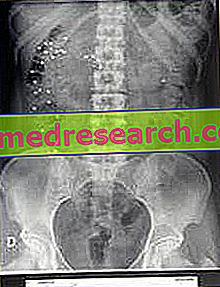Related articles: Ossuriasis
Definition
Oxyuriasis is an intestinal parasitosis caused by a nematode worm, Enterobius vermicularis, more commonly known as oxide. The infestation affects mainly preschool and school-age children.
Pinworms reach maturity in the intestine in 2-6 weeks. The female migrates to the anus (generally during the night) and deposits the eggs within the skin folds. The movements of the female worm and the viscous substance in which it deposits the eggs are responsible for anal itching.
Usually, oxyuriasis occurs following the transfer of the parasite eggs from the perianal region to the mouth of a new host. This is possible due to the contamination of vehicles, such as food, clothing, bedding, blankets and toys. The eggs deposited in the environment can survive for 3 weeks at normal domestic temperature.
The habit of sucking the thumb is a risk factor for ingesting the eggs of the parasite. Re-infestation (self-infestation) is frequent and can easily occur in children who scratch and bring dirty hands to their mouth.
Most common symptoms and signs *
- Halitosis
- Anorexia
- Dysuria
- Abdominal pain
- Insomnia
- Restlessness
- Nervousness
- Pallor
- Weight loss
- Vaginal discharge
- itch
- Anal itching
- Vaginal itching
- Vaginal dryness
- Strangury
Further indications
The main symptom of oxyuriasis is perianal pruritus. Locally, perianal irritation and excoriation may develop due to continuous scratching. Other symptoms include irritability, loss of appetite, abdominal pain, insomnia and restlessness. Rarely, pinworms go up the female genital tract, causing vaginitis and peritoneal lesions.
Pinworm infestation can be diagnosed by visual identification, at night or early morning, of white and filiform worms in the perianal area. Microscopic examination, on the other hand, allows the presence of eggs to be verified. Less frequently, eggs may be found in faeces, urine or vaginal smears.
To eradicate pinworms it is possible to use pharmacological therapies based on mebendazole, albendazole or pyrantel pamoate. Some preventative measures are of fundamental importance, such as treating intimate hygiene every morning (to eliminate the eggs released during the night) and washing hands before touching or eating foods.



